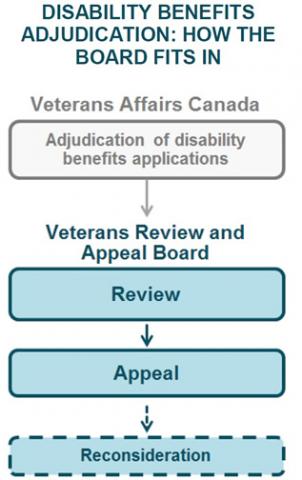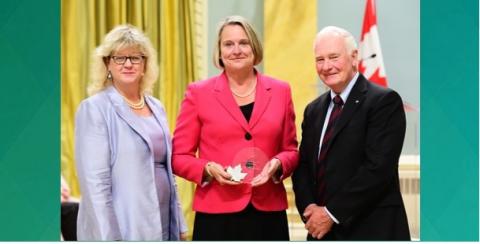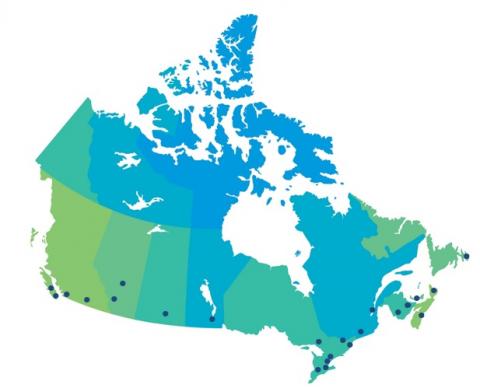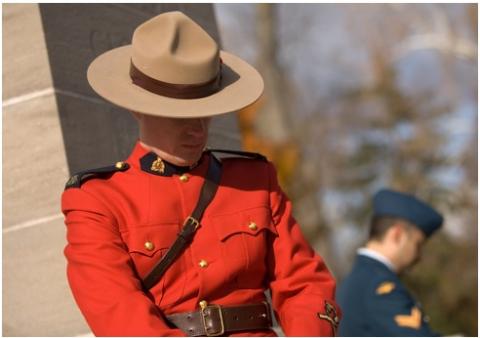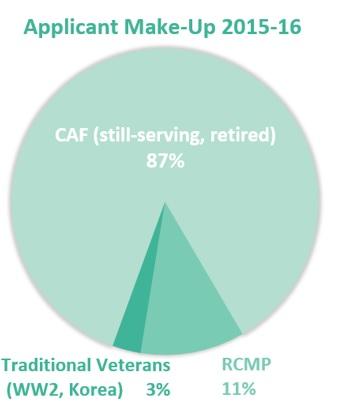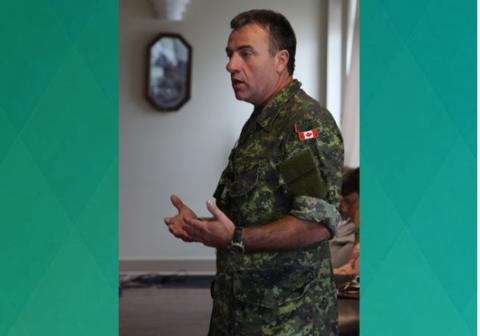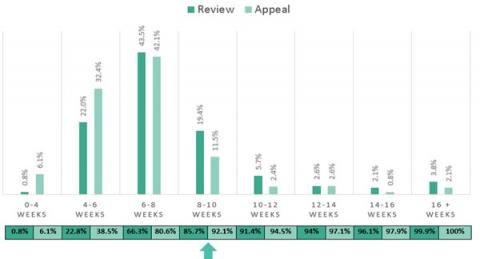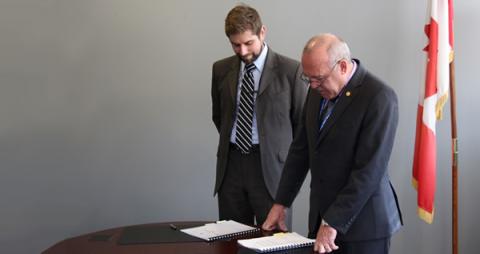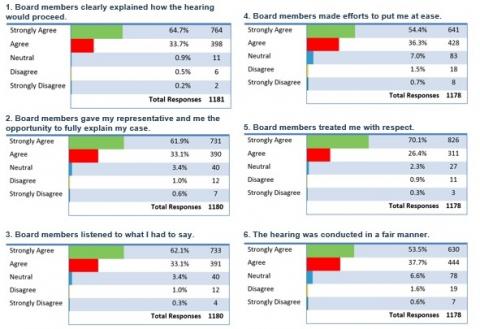
ISSN 2368-027X
Table of Contents
Chair's Message
This Annual Report details the Veterans Review and Appeal Board’s work in 2015-16 to deliver a national appeal program for Veterans’ disability benefits decisions made by Veterans Affairs Canada.
In September 2015, the Board celebrated its 20th year of providing Veterans and their families with the opportunity to appear before impartial decision-makers, tell their stories, and present new evidence in support of their applications. Thanks to this hearing process, the Board has awarded new or increased benefits to tens of thousands Veterans.
In 2015-16, the Board continued its work to provide Veterans with a fair appeal process. It was an important year for high-level planning: we completed a program evaluation and developed a new five-year strategic plan that will help us build on our accomplishments and address our challenges. Our strategic plan, in particular, sets out three priorities for the future: providing Veterans with excellent service; maintaining a high-performing organization; and being open and accountable about our work.
Last year, we made great progress in a number of areas. Through several initiatives, we reduced our processing times so that Veterans have their cases heard and decided as quickly as possible; last year, 86% of Veterans had their Review cases heard and decided within 10 weeks. Another area where we saw positive results was in our exit survey, through which the vast majority of Veterans told us they had a fair and respectful Review hearing. Another milestone was the Board’s entry into social media with the launch of its Twitter accounts, which are helping us to provide accurate, up-to-date information directly to interested individuals.
I am very proud of the work and progress accomplished at the Board last year to ensure that Veterans are being well-served by the appeal process and receive all the benefits they are entitled to under law. I would like to thank the many Veterans’ organizations and stakeholders who give us invaluable information and feedback to help us serve Veterans better. I would also like to thank our Board Members and staff for their hard work and dedication in serving Veterans and their families.
Thomas Jarmyn, CD
Acting Chair
Veterans Review and Appeal Board
1. Who We Are and What We Do
Created in 1995, the Veterans Review and Appeal Board (VRAB, the Board) is the arm’s-length tribunal that provides an independent avenue of appeal for disability benefits decisions made by Veterans Affairs Canada (VAC, the Department).
WHAT WE DO FOR ILL AND INJURED VETERANS
The Board ensures that Canada’s Veterans receive the disability benefits to which they are entitled under the law. To do this, the Board offers two levels of redress for disability benefits decisions: a Review hearing; and, if the Veteran remains dissatisfied, a subsequent Appeal hearing.
The Board also hears Critical Injury Benefit applications and provides the final level of appeal for War Veterans Allowance decisions.
In 2015-16, the Board had an operating budget of $9.5 million to deliver a national appeal program with hearings across the country.
AN INDEPENDENT APPEAL PROCESS
The Board operates at arm’s length from the Department to provide a fair and independent appeal process. This means that the Board is an entirely separate organization. As independent decision-makers, Board Members are not bound by previous decisions and will change them to benefit Veterans based on credible evidence.
VISION, MISSION, VALUES
The Board’s Vision, Mission, and Values express our commitment to serving Veterans and their families. These statements inform our work and guide all employees.
- Vision
- The Board is recognized as the independent and fair appeal tribunal that ensures Veterans obtain the benefits they are entitled to for service-related disabilities.
- Mission
- To provide Veterans, Canadian Armed Forces and RCMP members, and their families with timely, respectful hearings and fair, plain-language decisions.
- Values
- Independence: We provide Veterans with hearings and decisions that are free from outside influences.
- Impartiality: We treat Veterans in a fair and unbiased manner.
- Respect: We treat Veterans, and one another, with courtesy and respect.
- Excellence: We strive to serve Veterans better through continuous improvement and innovation.
- Integrity: We enhance public confidence and trust in the appeal process by being professional and ethical.
- Accountability: We are open and transparent, so that Veterans and Canadians can hold us accountable for our actions and decisions.
THE BOARD: AN ADMINISTRATIVE TRIBUNAL
Administrative tribunals like the Board are highly specialized in the kind of cases they hear. They give dissatisfied people an avenue of appeal that is less formal, less costly, and less time-consuming than the courts.
The Board’s work is governed by the:
It is important to note that section 3 of the VRAB Act requires the Board to liberally construe and interpret the legislation to fulfill the recognized obligation of the people and Government of Canada to those who have served their country so well, as well as their dependents.
Applications for Review and Appeal can be made to the Board under the:
- Pension Act;
- Canadian Forces Members and Veterans Re-establishment and Compensation Act - Part 3 (New Veterans Charter);
- War Veterans Allowance Act;
- Royal Canadian Mounted Police Pension Continuation Act; and
- Royal Canadian Mounted Police Superannuation Act.
Text Version
Our Organization
The graphic describes VRAB's organizational structure.
The top line of the organizational structure graphic contains the Chairperson position. Solid lines are drawn from the Chairperson position to the Deputy Chairperson and members' positions and to the Director General position.
A dotted line leads from the Chairperson position to Legal Services unit.
Solid lines are drawn from the Director General position to Operations and Professional Development, Legal Services, Strategic and Corporate Services, Communications and Systems Units.
OUR ORGANIZATION
The Board is a micro-organization with a small, dedicated staff. The Chairperson, appointed by the Governor in Council, is the Board’s Chief Executive Officer and reports to Parliament through the Minister of Veterans Affairs.
The Board has up to 25 full-time Members (including the Chair and Deputy Chair). They hear cases brought forward for redress at the Board, and decide whether the evidence meets the requirements of the legislation to award new or increased levels of disability benefits.
The Director General provides strategic leadership for the effective planning and management of Board operations and corporate management functions. The Board employs approximately 80 public servants to support the delivery of its program.
In September 2015, the Board’s Director General Dale Sharkey received the Public Service Award of Excellence in the Outstanding Career category from His Excellency the Right Honourable David Johnston, Governor General of Canada, during a ceremony at Rideau Hall, in Ottawa. She was recognized for an exemplary public service career including the last 17 years as the Board’s most senior public servant.
2. The Board's Program
At Board hearings, Veterans can bring forward new information, give oral testimony, and have arguments presented in support of their applications. Board Members are there to listen and ask questions to help them make a fair and informed decision.
REVIEW HEARINGS
Review hearings are conducted by panels of two Board Members in locations across the country. Here, Veterans have the opportunity to give oral testimony, present evidence and arguments, and bring witnesses in support of their case.
This is their only opportunity in the disability benefits adjudication process to appear before decision-makers and tell their story in their own words. Veterans have access to free legal counsel through the Bureau of Pensions Advocates (BPA), and are reimbursed for their travel costs to attend their hearings.
The Board’s process is non-adversarial, which means no one is arguing against the Veteran or defending the VAC decision under review.
Hearings are open to the public, except in special circumstances where the Veteran requests and is granted a closed hearing (subsection 36(2), VRAB Act). We encourage members of the public to attend hearings, as this contributes to a greater understanding of the Board’s decision-making. Anyone interested in observing hearings should contact us so that we can confirm hearing locations and dates.
Text Version
Review Hearing Locations
The following is a list of Review Hearing locations:
- St. John's
- Sydney
- Halifax
- Charlottetown
- Moncton
- Fredericton
- Quebec
- Montreal
- Kingston
- Ottawa
- Peterborough
- Toronto
- Hamilton
- London
- North Bay
- Winnipeg
- Regina
- Calgary
- Edmonton
- Penticton
- Vancouver
- Victoria
- Courtney/Comox
APPEAL HEARINGS
If a Veteran is dissatisfied with their Review decision, they can request an Appeal hearing which is the second and final level of redress.
Appeal hearings are conducted primarily in Charlottetown, Prince Edward Island by panels of three Board Members who did not hear the same case at Review. While the legislation does not permit oral testimony at this level, the Appeal hearing provides a further opportunity for a Veteran, through their representative, to submit new information and make arguments in support of their case. Appeal decisions are final and binding.
WHAT IF A VETERAN IS DISSATISFIED WITH AN APPEAL DECISION?
Veterans who are dissatisfied with their final-and-binding Appeal decision can apply to the Board for a Reconsideration (i.e. a reopening of the case) if new, credible, and relevant evidence comes to light at a later date, or if an error in fact or law is found in the Appeal decision.
If a Veteran has exhausted all redress options at the Board and is still dissatisfied, they have the right to apply to the Federal Court of Canada for a judicial review of the decision. In a judicial review, the Court’s role is to decide whether the Board made a reasonable decision based on the evidence before it and whether it properly performed its function in making the decision, not to rule on the merits of the case (i.e. whether the Veteran should receive a favourable decision from the Board).
Written Decisions with Reasons
After a hearing, Board Members discuss the information and arguments of the case to make a decision. They conduct a thoughtful analysis of all available information (i.e. oral testimony, medical reports, opinion evidence from experts, written statements, etc.) and discuss the merits of the case, bearing in mind the requirement to resolve any doubt in the weighing of evidence in favour of the Veteran. At Review, if the two panel members disagree, the decision most favourable to the Veteran stands; at Appeal, the decision of the majority of the three panel members stands.
The Board is required by law to prepare written reasons to inform Veterans of how and why the decision has been made. These are prepared at the Board’s office in Charlottetown and usually mailed within six weeks of the hearing. This time is needed to ensure decisions are well-reasoned and clearly written.
3. Caseload
In 2015-16, the Board continued to focus on providing Veterans with timely, respectful hearings and fair, plain-language decisions.
INCOMING CASES
A good indicator of how many applications the Board is likely to receive in a given year is the volume of VAC’s disability benefits decisions from the previous year.
Although our caseload is primarily correlated with the VAC decision volumes, it can fluctuate from year to year due to other factors. One of these is that there is no time limit to bring forward an appeal, i.e. Veterans can request an independent review of their VAC decision at any time.
During the last five years, our Review decisions have represented between 8.3% and 9.8% of VAC’s decisions from the previous year with appeal rights to the Board.
| Fiscal Year |
VAC decisions* |
VRAB Review decisions |
As a % of VAC's decisions |
|---|---|---|---|
| 2015-16 | 37,004 | 2,507 | 8.5% |
| 2014-15 | 29,480 | 2,729 | 9.3% |
| 2013-14 | 32,963 | 3,213 | 9.7% |
| 2012-13 | 35,139 | 3,236 | 9.2% |
| 2011-12 | 35,491 | 3,636 | 10.2% |
*VAC decisions with appeal rights to VRAB, i.e. first applications, medical reassessments, and departmental reviews.
New government initiatives for Veterans and their families can also impact the Board’s work. For example, in 2015 the Board began providing redress for the Critical Injury Benefit which had been introduced that year.
Regarding the individuals who made applications to the Board in 2015-16, there was a small change in the breakdown of service, with fewer applications from still-serving and retired CAF members, and more applications from RCMP applicants.
WORKLOAD STATISTICS
The tables below provide information about the nature, volume, and outcome of cases at the Board, as well as information on the number and outcome of Federal Court judicial review decisions.
| Fiscal Year |
Review | Appeal | Reconsideration | War Veterans Allowance |
Total Decisions |
|---|---|---|---|---|---|
| 2015-16 | 2,507 | 793 | 87 | 2 | 3,389 |
| 2014-15 | 2,729 | 1,039 | 105 | 4 | 3,877 |
| 2013-14 | 3,213 | 1,159 | 142 | 11 | 4,525 |
| 2012-13 | 3,236 | 928 | 121 | 9 | 4,294 |
| 2011-12 | 3,636 | 1,072 | 178 | 22 | 4,908 |
| Fiscal Year |
Review % Favourable |
Appeal % Favourable |
|---|---|---|
| 2015-16 | 52 | 39 |
| 2014-15 | 49 | 43 |
| 2013-14 | 47 | 43 |
| 2012-13 | 51 | 34 |
| 2011-12 | 50 | 29 |
** Note: The Board’s systems track applications received. An application may include rulings on more than one medical condition or type of service. When a Veteran receives an increased level of entitlement or assessment for one aspect of their application, the decision is counted as favourable.
| Fiscal Year |
Number of FC decisions |
Number that upheld VRAB decision |
Number that overturned VRAB decision |
|---|---|---|---|
| 2015-16 | 10 | 8 | 2 |
| 2014-15 | 6 | 4 | 2 |
| 2013-14 | 11 | 8 | 3 |
| 2012-13 | 10 | 6 | 4 |
| 2011-12 | 14 | 7 | 7 |
NATURE OF APPLICATIONS AND DECISIONS
In general, the Board receives two kinds of applications: those for entitlement to benefits based on the relationship between the disability and service, and those related to the level of assessment based on the extent or severity of the disability. In 2015-16 (as in recent years), entitlement cases made up three-quarters of our work, and assessment cases one-quarter.
Members often rule favourably due to a combination of factors. Last year, when we looked at all favourable Review decisions, we found that testimony and/or new medical or other documentary evidence were the basis for 75% of them. In the remaining cases, Members ruled favourably based on the available evidence, changes in policy/law, or errors in the previous decision.
This information demonstrates the ongoing need for an independent appeal process so that Veterans receive timely access to benefits for their service-related disabilities. We continue to share the Board’s reasons for awarding with VAC to support their efforts to identify trends and opportunities for improvements.
EVOLVING DEMAND FOR HEARINGS
The geographical distribution of Veterans applying for a Review hearing can vary annually. This fluctuating demand has an impact on scheduling and travel for hearings.
In 2015-16, the demand for hearings declined in some locations and increased in others. As it does every year, the Board worked closely with representative organizations to determine where and how often it should convene hearings based on the demand from Veterans and other applicants.
The Board offers videoconferencing across the country, especially for low-volume locations, in order to get cases heard more quickly. We continue to encourage representatives to speak with Veterans about the possibility of videoconferencing.
In 2015-16, we also continued our priority to hear cases from Veterans of the Second World War and the Korean War in recognition of their service and age.
CWO Shawn Patterson, CAF Liaison to Veterans Affairs, speaks to the Board's staff about military service, deployments, and the troops’ mental health.
COMPLEXITY OF CASES
As more Veterans receive positive outcomes earlier in the process (i.e. at VAC first application or departmental review), we have noted that the cases appealed to the Board tend to be less straightforward than in the past. These cases often involve complex medical conditions and other issues that make it challenging for the Veteran to establish the required relationship between the disability and service.
This increased complexity has had an impact on the Board’s operations and decisions. Perhaps most significant is the time spent by Veterans and their representatives obtaining supporting evidence to prepare their case. The Board does not limit this valuable time; instead, we wait for the representative to tell us they are ready to proceed before scheduling the hearing.
For its part, the Board requires additional effort and time to provide quality documentation for Veterans’ hearings. We ensure that the Statement of Case (the evidence package used by all the hearing parties) is well-organized, accurate, and complete. As a first step, we obtain relevant records—Veterans’ medical and service records—either from VAC or, increasingly from National Defence (if not previously requested by VAC). These records, which come from other organizations, sometimes contain errors. For that reason, we review all incoming documentation to ensure it pertains to the individual in question, that scanned documents are legible, and that there are no duplications.
After the hearings, Board staff support Members by reviewing decisions to ensure that information is presented logically, that evidence and arguments have been addressed, and that reasons are clearly and plainly expressed.
Going forward, we are continuing to explore ways to better prepare and equip our Members to deal with an increasing number of cases involving complex matters.
Free Representation
Veterans who are dissatisfied with a VAC decision have access to free advice and representation from external organizations with expertise in Veterans’ disability benefits.
The Bureau of Pensions Advocates (a free legal service provided by the Government of Canada) represents the vast majority of Veterans at Board hearings.
Service Officers from Veterans’ organizations represent some Veterans, while a small number of Veterans choose to represent themselves or hire a private representative at their own expense.
TIMELINESS
The Board strives to provide Veterans with timely service. We have demonstrated our commitment to timeliness by establishing service commitments for the time within our control, and meeting them for the vast majority of cases.
16 Weeks
When a Veteran decides to appeal their departmental decision to the Board, they contact the Bureau of Pensions Advocates or another representative organization. The representative works with the Veteran to prepare the case, taking valuable time to obtain additional information and evidence.
Once the representative and Veteran advise the Board that they are ready to proceed and the hearing is scheduled, our goal is to hear the case and issue a decision within 16 weeks. Last year, we achieved this in 96% of Review and 98% of Appeal cases. Also noteworthy is that the vast majority of cases (86% of Reviews and 92% of Appeals) were actually heard and decided within a much shorter time—just 10 weeks—as the following table shows:
Timely Decisions
The 16-week service commitment includes the time it takes for the Board to issue a decision. The Board’s commitment is to issue 80% of decisions within six weeks of the hearing date. Last year, the Board exceeded its goal, issuing 84% of Review and 89% of Appeal decisions within six weeks of the hearing.
4. Year in Review
In 2015-16, the Board continued to focus on service excellence for Veterans through continuous program improvements.
OPERATIONS
Making Progress on Paperless Hearings
The Board continued to work on designing a paperless process to increase efficiency and reduce time spent mailing documents between our administration office in Charlottetown and hearing locations across Canada. We reviewed each step in the process—from the Veteran’s application to the Board’s decision—and identified opportunities to receive, share and monitor work electronically. In particular, the Board:
- Expanded the functions of the systems used to schedule hearings and monitor applications;
- Tested tablets as a tool for Members;
- Added new types of documents to the web-based application that stores information used by Members for hearings and decisions;
- Enhanced our Wiki to give Members across the country online access to general resources for decision-making; and
- Helped Members develop their technical skills and asked for their feedback on the documents they need in digital form to conduct hearings.
This service improvement project represents a major change in the way the Board operates: it involves new systems, new equipment, and new methods of sharing information so that Veterans’ applications move more quickly through the process without relying on paper.
Going paperless will make the Board’s process more efficient and reliable so that we can process Veterans’ applications faster.
Improving Information Management
In 2015-16, the Board began implementing GCDOCS, the Government of Canada’s new content management system that promotes consistent record-keeping across the public service. To be clear, this system is not used for managing Veterans’ personal information related to their applications to the Board: instead, it is for managing corporate and program information that supports our operations. In 2015-16, the Board took the following steps:
- Completed a comprehensive review of our information holdings;
- Developed a new filing structure for GCDOCS;
- Trained staff on how to use the new system; and
- Began transferring documents for storage and use in GCDOCS.
GCDOCS represents another big change in the way the Board operates. Overall, it will help our employees to find, share and preserve information of business value more effectively and securely—which means better service for applicants.
PUBLISHING DECISIONS
As a quasi-judicial tribunal, the Board is bound by the open court principle, which assumes that public confidence in—and understanding of—decision-making requires openness and transparency. Publishing decisions is important because it allows Veterans to see how the Board applies the law in cases similar to their own, and shows Canadians that the Board is fulfilling its obligations. In short, publishing decisions increases transparency and confidence in the appeal process.
In 2012, the Board committed to making its decisions more open and accessible to Veterans and the public. We began by publishing our most important, noteworthy decisions on our website. And, in 2015 we started publishing decisions resulting from cases returned by the Federal Court following a judicial review, as well as links to Federal Court decisions which review the Board’s decisions.
In 2015-16, the Board made significant progress on its commitment to publish more decisions. We began publishing all Appeal and many Review decisions on the Canadian Legal Information Institute’s website (CanLII).
CanLII is a well-known legal resource that organizes decisions by year and is searchable by key word. By March 31, 2016, we had published 1,900 decisions. Though not required to, the Board depersonalizes decisions before publishing in keeping with best practices from the Office of the Privacy Commissioner of Canada.
DECISION-MAKING
The Board is required to provide written reasons for its decisions so that Veterans know how and why the decision has been made.
The following three decisions, issued in 2015-16, are important ones that may have implications for other, similar cases.
Compassionate Award
In 2015, the Board issued a leading and persuasive decision that reviewed the legislation and set out the criteria for compassionate awards, which are made under section 34 of the VRAB Act and are an extraordinary remedy that fall outside the usual appeal process.
The Board’s decision is a positive one for Veterans because it provides a more generous interpretation of the legislation. Specifically, it concludes that a Veteran can apply for a compassionate award if they have exhausted redress at the Board for a single application/medical condition (vs. being required to have exhausted redress for all applications/medical conditions they might have).
Moreover, the decision moves away from assessing whether or not service is “meritorious” as a basis for the award, and instead accepts that any Veteran with an honourable release may be considered for a compassionate award if there is a connection between the service and the circumstances resulting in the Veteran’s financial need.
Exceptional Incapacity Allowance
In 2015, the Board issued a leading and persuasive decision that dealt with the issue of the effective date for an Exceptional Incapacity Allowance (EIA).
This decision was a positive one for Veterans because it ruled that the effective date for an EIA can be earlier than the application date if the health records and evidence establish that a Veteran became exceptionally incapacitated before applying for the allowance.
Contribution of military service to a disability
Judicial review is an important and constructive part of the adjudicative process, and is one way that interpretation of the law evolves and progresses over time. In our context, Veterans can benefit from Court decisions that clarify and expand the understanding of disability pension law, which was the case in a decision issued by the Federal Court of Appeal (FCA) in 2015.
In Cole v Canada (Attorney General), the FCA clarified part of the test for establishing a Veteran’s entitlement to a disability pension. It ruled that in cases where there are both military and non-military direct causes of a condition, the Veteran only has to show that the military causes were a significant cause, and not a primary cause.
Following this FCA decision, the Board reheard the case according to the Court’s instructions. In its Appeal rehear decision, the Board awarded two-fifths entitlement to the Veteran, finding that—although it wasn’t a primary cause—military service had contributed to the onset of and/or had aggravated the claimed condition.
The following three decisions, issued in 2015-16, illustrate the value of new evidence and testimony in cases that come before the Board.
Unhealthy work environment
This case was about a member of the RCMP who claimed a disability of Post Viral Anosmia caused by a virus contracted because of an unhealthy work environment. In its decision, the Board was able to rule favourably due to new evidence (an air quality testing report for the environment where the RCMP member had worked), that had not been available to the Department when they made their initial decision.
Injury incurred during authorized sports activity
This case was about a military member who injured his thumb while playing basketball at a tournament at his naval base. He had been denied entitlement based on a lack of evidence that the basketball game was a military-authorized activity or that it was in the interest of service. The applicant provided new evidence, in the form of a base newspaper article about the tournament and testified to this at the hearing. In its decision, the Board found that the evidence clearly established that the basketball game was part of a military-authorized tournament.
Use of internet articles as evidence
The main issue in this case was the kind of evidence that had been provided to support the argument that the claimed disability of obstructive sleep apnea had been caused by the Veteran’s PTSD. In its decision, the Board explained that the various internet articles did not constitute medical evidence. It also spoke generally about why articles and extracts from the internet—where the identity of authors, their qualifications, or their motivations may be unknown—are unhelpful. For these reasons, the Board was unable to rule favourably.
BOARD MEMBERS
Appointments
In 2015-16, the Board was pleased to welcome one new Member (a CAF Veteran), and to have several Members reappointed for one-year terms. These Members helped us to maintain timely service to Veterans and their families.
On March 31, 2016, thirteen of the Board’s 20 Members had military, RCMP/policing or health care backgrounds.
Member Selection Process
In February 2016, the Prime Minister of Canada announced a new approach for Governor in Council (GIC) appointments with a focus on open, transparent and merit-based selection processes, and gender parity and diversity in appointments. This would include a review of existing selection processes across government—including the Board’s—to ensure they reflect these common goals going forward.
As a first step towards implementing the new approach, the government launched a new feature on the GIC website in March 2016 for Canadians to register online to apply for future appointment opportunities.
Member Training and Professional Development
Like all courts and tribunals, the Board strives for consistency in decision-making by supporting its decision-makers through ongoing training, quality review of decisions, and performance feedback. In 2015-16, the Board renewed its professional development program for Members and began using WebEx to integrate relevant training into monthly meetings.
In March 2016, the Board held its annual training session where Members learn from legal, medical and military experts on topics directly related to their role as decision-makers. Guest presenter Lieutenant-General Christine Whitecross, Chief of Military Personnel, spoke about the military’s response to workplace harassment while other CAF personnel presented on mental readiness in service. The seminar also gave Members and staff the opportunity to discuss common topics in decision-making, including an overview of the new Critical Injury Benefit which has appeal rights to the Board.
Training for Board Members 2015-16
From the CAF:
- Systemic Progress on Workplace Harassment and Inappropriate Sexual Behaviour: Building Resilience in New Recruits (LGen Christine Whitecross, OMM, CD)
- Conflict and Harassment Briefing (Mr. Robert Grenier, Department of National Defence)
- Road to Mental Readiness: Challenges and Opportunities (Maj. Jean Boily and Dr. Jennifer Purdy)
- Harassment
From legal experts:
- Bias (Professor Paul Daly, Associate Dean at the Faculty of Law, University of Montreal)
From Board staff:
- Paperless Hearing Process
- Contribution of Service
- Effective Dates
- Critical Injury Benefit
- Assessments
- Allowances
- Medical Mismanagement
VRAB Legal counsel François Comeault administers the Oath of Office for new Board Member and Veteran Terry Prowse.
COMMUNICATIONS AND OUTREACH
The Board continued to make timely, accurate, and clear communications about its program a priority in 2015-16. Our goals were to raise awareness of appeal rights among serving personnel as well as to help applicants better understand the appeal process itself.
Outreach with Serving Personnel
The Board continued to engage with senior military leaders about the appeal program and how important it is for CAF members to report injuries, get treatment and document nagging conditions. We briefed the new Chief of Military Personnel, Lieutenant-General Christine Whitecross, and provided opportunities for her and other generals in her office to observe Review hearings to see how the process works.
The Board participated in an information session for serving personnel at CFB Greenwood and gave a presentation to staff and students at the Canadian Forces College in Toronto. We continued to build relationships with the CAF and RCMP Liaisons to Veterans Affairs, and to rely on their help and knowledge of life in service.
Outreach with Veterans
The Board also worked with Veterans’ organizations to broaden its outreach in 2015-16. We continued to share information through written updates and meetings, and to support medically releasing CAF members with our video presentation at the Second Career Assistance Network seminars. To promote excellence in service delivery for Veterans, the Board met regularly with representative organizations and participated in training for new Service Officers with the Royal Canadian Legion.
Outreach with Parliamentarians
In late 2015 into 2016, the Board provided information briefings to new Parliamentarians to introduce them to its work for Veterans. We welcomed the new Minister of Veterans Affairs and Associate Minister of National Defence to Charlottetown in November, and engaged with the Parliamentary Secretary and the Veterans Affairs Critics in Ottawa. In March, our Acting Chair had the opportunity to appear at the Senate Subcommittee on Veterans Affairs to talk about the appeal process and to answer questions.
Web Work
The Board continued work behind-the-scenes to transfer its current web content into the new standard templates that will make it more accessible and mobile friendly. This update will also make it easier to migrate our information to Canada.ca, the Government of Canada’s new central website. The Board now has an institutional profile on that site, and continues to look for opportunities to maintain and develop our online presence within the government’s web renewal initiative. We also revamped the FAQs on our website, adding information about compassionate awards and other useful topics.
Follow us on Twitter!
The Board was very pleased to launch its official Twitter accounts in English (@VRAB_Canada) and French (@TACRA_Canada) in late October 2015, after much planning and work to meet government standards for social media accounts. We joined Twitter because of the platform it presents for sharing information. It was also a good fit with our ongoing efforts to broaden and modernize our communications program. We are using Twitter to:
- Provide accurate information directly to Veterans, stakeholders, and Canadians;
- Engage with individuals and reach new audiences; and
- Raise awareness of the Board’s program and its value.
During the year, we tweeted out links to useful web content (like our last Annual Report and the Board’s evidence requirements), photos of our outreach activities, and tips and facts about the appeal program. To reach our target audiences and gain new followers, we used hashtags like #Veterans, #RCMP and #CAF and promoted our Twitter handles online and in our publications. We encourage you to follow and interact with us!
Three Board employees participated in a CAF familiarization activity for Veterans Affairs that began with a flight in a CC-130 Hercules aircraft from Charlottetown to 14 Wing Greenwood, where they learned first-hand about the operational role of the wing, the conditions of work for various trades and the stresses and challenges for RCAF members.
FEEDBACK
In 2013, the Board established an exit survey to gather feedback on the Review hearing experience. We did this because we wanted to know how Veterans felt about their hearings, whether we were fulfilling our commitment to provide a respectful hearing experience, and whether there was anything we could do to improve the hearing for Veterans.
Over the last three years, approximately half of all Veterans who had a Review hearing completed our exit survey, providing us with a great deal of useful information. The exit survey is completed by email or telephone after the hearing but before the decision is issued, and is completely anonymous.
97%
said that the Board
treated them with
respect.
In 2015-16, as in the two preceding years, the vast majority of Veterans indicated that they had a good experience at their hearing. In fact, our results were slightly more positive than the previous year, which we attribute to improvements we have made to Member training and communications. Of particular importance, 97% told us that Board Members treated them with respect, and 91% said their hearing was conducted in a fair manner.
95%
said Board Members
listened to what
they had to say.
Through a final, open-ended question, Veterans also provided us many extremely positive comments as well as with instructive feedback about how we could do better. As in previous years, the most common feedback dealt with: the role of questions at the hearing; the feeling that the hearing was rushed; and general feelings about appearing at the hearing (i.e. that it could be stressful, cathartic, too formal, etc.). The Board has used this kind of feedback over the last two years to inform Member training and improve communications (both before and at the hearing). We will continue to address this feedback and look for further opportunities to improve the hearing experience for Veterans.
91%
said their hearing
was conducted in a
fair manner.
Review Hearing Exit Survey 2015-16
5. Looking Ahead
In 2016-17, we will continue to work hard to provide Veterans with the best service possible when they come to us for redress of their disability benefits decisions.
Next year, we will
- focus on quality and consistent decision-making through ongoing training/development, performance feedback, and support for our Board Members;
- further integrate technology into the Board’s operations to establish efficient and time-saving processes;
- work with representatives to expand hearing opportunities and identify flexible scheduling practices that benefit applicants; and
- implement action plans from audits and evaluations of the Board's program.
Beyond timely hearings and fair decisions, we will continue to improve our communications and outreach to provide accurate and useful information about the Board’s independent appeal process. In particular, we will:
- publish more decisions and resources online to help Veterans understand how the Board deals with evidence and applies the law;
- publish the Review hearing calendar to inform applicants and stakeholders;
- focus on plain language in our communications; and
- expand our outreach with the CAF and RCMP, Veterans’ organizations, and other groups dedicated to supporting Veterans and their families.
Contact Us
If you have any questions about the Board's work or would like more information about our program, please contact us:
- Email:
- VRAB.VRAB-TACRA.TACRA@vrab-tacra.gc.ca
- Telephone:
Toll Free in Canada and the United States - 1-800-450-8006 (English)
- 1-877-368-0859 (French)
- Telephone:
From all other locations, call collect - 0-902-566-8751 (English)
- 0-902-566-8835 (French)
- Mailing Address:
-
Veterans Review and Appeal Board
Post Office Box 9900
Charlottetown PE C1A 8V7 - Fax:
- 1-855-850-4644
- Website:
- www.vrab-tacra.gc.ca

